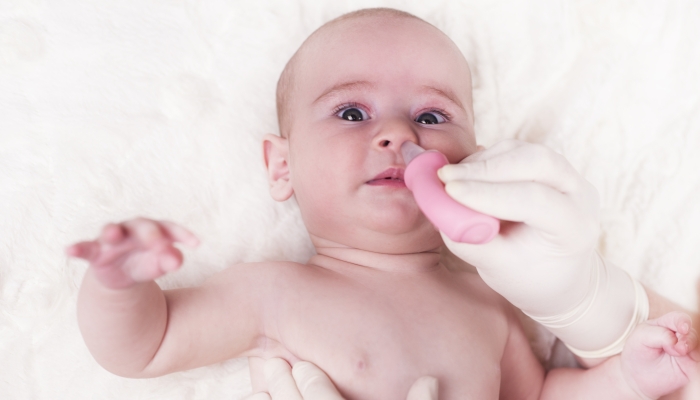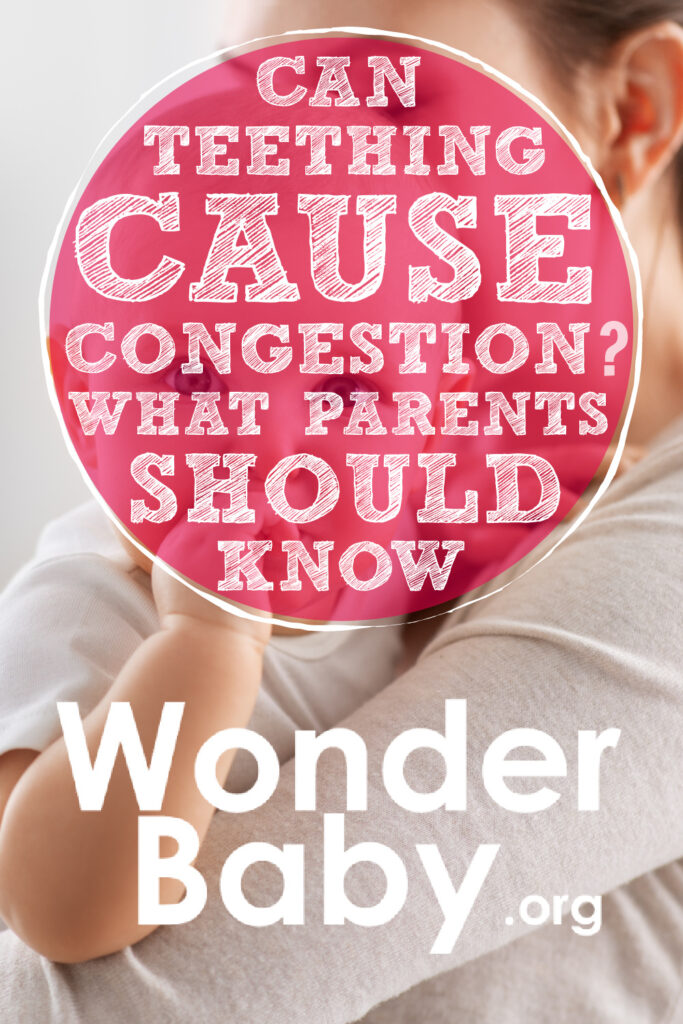Can Teething Cause Congestion? What Parents Should Know

- Teething happens to babies between 3 months and 3 years old.
- Teething can cause chewing, rash, drooling, gum pain.
- Teething does not directly cause fevers, congestion, or diaper rashes.
- When your baby is teething, they may be more susceptible to other illnesses.
Teething is a tough stage for babies and their parents. Teething babies can be more fussy than usual and may have trouble sleeping, and they can endanger themselves by putting anything and everything they can get their hands on into their mouths.
Many parents believe teething can cause other symptoms like fevers, diaper rashes, and congestion. Unfortunately, this might encourage parents to delay seeking care for their children when they’re fighting a virus or infection.
As a parent, you have to be careful in identifying your child’s symptoms and do a little detective work to figure out the cause. So, can teething cause congestion? Here’s what parents should know.
Can Teething Really Cause Congestion?
Teething can be painful for your baby, but it should not cause a runny nose. According to Seattle Children’s Hospital, research shows that teething itself does not cause a runny nose.
Parents will argue that their baby gets a runny nose every time a new tooth appears. The most likely cause is actually an infection that their baby picked up by putting dirty items in their mouths or chewing on their hands.
In addition, teething can cause an inflammatory response in the body, making the immune system less effective. This makes it even more likely that they’ll pick up a virus or infection while teething. Runny nose, diarrhea, and fevers are not common teething symptoms but are symptoms of infection.

How to Tell If Congestion Is Due to Teething
If your baby has a runny nose, don’t assume that it is a normal part of the teething process. While new teeth may make your baby fussy and cause them pain, they should not have a runny nose or fever.
Expected Teething Symptoms
Wellness professionals at PearlShine Dental Clinic state that there are several symptoms of teething that you can watch out for. These include:
- Drooling
- Face rash
- Extra saliva
- Irritability
How to Tell If Your Baby’s Congestion Is Caused by Something Else
A runny nose is usually caused by a virus, and viruses mostly clear up on their own with rest and drinking enough fluids. It is very rare for congestion to be caused by teething alone. If your baby is teething, their immune system can’t fight off other illnesses as effectively, and they’re more likely to get sick.
Tips for Care for Your Congested Baby
If your baby is congested, you’ll first want to find out what health conditions are causing their congestion. See your pediatrician to determine whether they have a mild cold, an ear infection, or something else.
At home, there are a few things you can do to help care for your congested baby:
- Use a bulb syringe to clear out mucus.
- Use saline drops to thin mucus and clean out the nasal passages.
- Put a cool mist humidifier in your baby’s room.
- Use infant acetaminophen or ibuprofen for fevers.
When to Consult a Doctor
It is easy for many parents to blame teething for a runny nose, excessive crying, sleeping problems, high fever, diaper rash, and loose stools. However, These are all signs of illness—not teething symptoms.
If congestion is not taken care of, it could develop into an ear infection. Ear infections are very painful and can even cause ear damage if they are not treated properly. If your baby has persistent symptoms of runny nose, fever, poor appetite, or excessive crying, seek medical attention for them as soon as you can.
How to Care for Your Teething Baby
It’s exciting for your baby to get their first tooth. But if your baby seems to be constantly teething and fighting off colds, teething can feel like a long process. Thankfully, there are a few things you can do to help your baby with their teething pain.
Cold Washcloth
One of the easiest and least expensive ways to soothe your baby’s mouth and gums is to let them chew on a cold washcloth. Simply wet a washcloth with cold water and give it to your baby. While the water you use should be cold, do not put it in the freezer. Items that are too cold or frozen can damage your baby’s gums.
Teething Rings
If your teething baby needs something to chew on, you can give them a teething ring that has been cooling in the refrigerator. The cold temperature will help them with pain relief, and the texture of the ring will feel good in their aching mouth. Teething rings are good for babies of any age.
The same rule applies for a washcloth or teething ring. Using cold items is great, but using frozen items is harmful.
Gum Massage
Gum massage works by putting gentle pressure on the gums to relieve your baby’s gum irritation. To give your baby a gum massage, use a clean finger to apply gentle pressure across the gums.

Unsafe Teething Treatments
According to John Hopkins Medical Center, you should not use numbing gels to soothe your baby while they are teething. These gels can actually be very dangerous for your baby and are not to be used for children or babies.
Teething gels that are specifically designed for babies are usually safe, but peer-reviewed studies performed by the NHS show that they are not very effective. Do not use any products that are not specifically designed for babies or products that have not been approved by the FDA for infant teething pain.
In 2017, the FDA announced safety problems with several homeopathic teething tablets. Teething tablets are not safe for use for children of any age.
Teething necklaces are another popular item marketed for helping your teething baby. Unfortunately, teething necklaces are both choking and strangulation hazards, according the the AAP.
FAQs
Can I use over-the-counter medicine for my teething baby?
If your baby is miserable, you may want to use over-the-counter medicines for your teething baby. Babies two months and older can be given acetaminophen (Tylenol) to help ease their pain. Ibuprofen should only be used for babies 6 months and older.
Make sure you double-check the dose of medicine and use the correct syringe for your baby’s age and weight. Some ibuprofen is more highly concentrated, meaning a smaller amount of liquid contains the same amount of medicine. Read medication labels carefully.
How can I help my baby’s nasal congestion?
Using a cool mist humidifier while your baby sleeps can help keep their nose moist and clear up their congestion. In addition, you can use a bulb syringe to help clear out their nose and help them breathe better.
What position should a congested baby sleep in?
Even for a congested baby, you should use the sleep-safe recommended practice of placing a baby on their back to sleep. Even though it seems counterintuitive, always put your baby on their back to sleep.
How long does congestion in babies usually last?
Many babies suffer through multiple separate cold or flu viruses during the winter seasons, and it can feel like your baby has a runny nose for months. Each individual cold or virus in babies should clear up in 10-14 days. If your baby’s congestion does not clear up after two weeks, see your healthcare provider.

The information WonderBaby provides is not intended to be, and does not constitute, medical or other health advice or diagnosis and should not be used as such. Always consult with a qualified medical professional about your specific circumstances.
Related Posts

Eye Conditions and Syndromes, Visual Impairment
Neuralink Announces Plans to Restore Sight to the Blind with Brain Chip
Elon Musk’s company Neuralink has announced plans to begin human trials of its new “Blindsight” brain chip by the end of 2025.

Health & Nutrition
Can Baby Skin Care Products Expire?
Is that forgotten tube of diaper rash cream still safe to use? Learn more about the expiration dates of popular skin care products for infants.

Health & Nutrition
Boosting Immunity in Kids: 3 Tips for a Healthy Winter
Parents can help boost their kids’ immunity during cold and flu season by maintaining healthy eating, sleeping, and exercising habits in the winter.